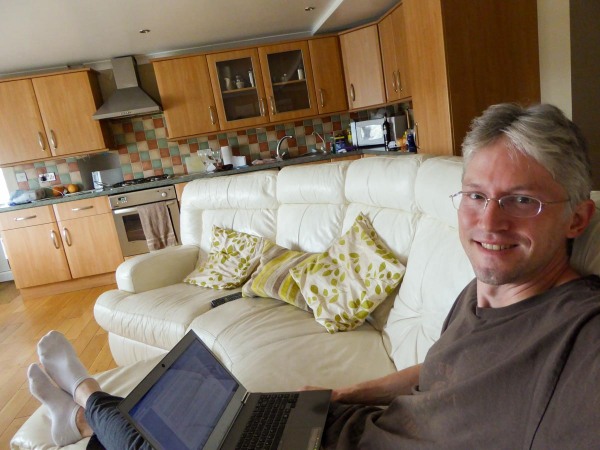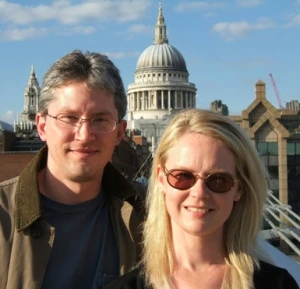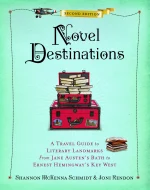
Not at all what David thinks.
I have to say I was a bit amused to read David Brooks’ most recent column from the comfortable couch of our two-bedroom apartment rental overlooking a harbor in Cornwall, England. You see, David is a bit confused about the emerging “peer-to-peer” economy. To his credit, he admits as much.
I’m one of those people who thought Airbnb would never work. I thought people would never rent out space in their homes to near strangers. But I was clearly wrong.”
He then tries to explain why his original prediction failed, only to demonstrate that he still doesn’t really get what’s going on.
On the one hand, he does seem to grasp the way in which new technologies are rendering rigid old structures flexible. On the other, he seems completely oblivious to the value such flexibility provides. It’s a theme that runs throughout the piece.
I’ll hazard a guess that his blind spot comes from a political philosophy that prefers to see people constricted in various ways. He may not realize it, but that isn’t what most people want. People really do value having options. That simple understanding would, I think, have made everything clear to him.
But for our purposes, let us start at the beginning.
First, I underestimated the effects of middle-class stagnation. With wages flat and families squeezed, many people have to return to the boardinghouse model of yesteryear. They have to rent out rooms to cover their mortgage or rent.”
This is a story that sounds plausible and follows a narrative that probably fits nicely within the New York Times opinion pages, but it doesn’t really hold up to scrutiny. Sure, there are undoubtedly people who are doing exactly what David describes, but hard-pressed homeowners aren’t the primary suppliers of Airbnb properties. All you have to do is look at the kind of spaces available to rent and that much becomes clear.
In midtown Manhattan, for example, a quick search pulled up 312 listings for entire homes, 166 for spare rooms in an occupied home and 36 for shared rooms. In other words, more than 60% of the listings were for spaces that are indistinguishable from vacation rental properties. We found the same thing in Paris, where a whopping 86% of listings were for entire homes. Clearly people renting out spare rooms to make ends meet aren’t the majority of Airbnb hosts.
So who are they?
From our experience Airbnb hosts are an extremely diverse group. Some are professional investors who manage multiple properties. That’s the case with the rental I’m currently typing from, where I don’t expect to ever meet the owner. Other people have converted their houses into basic bed-and-breakfast type hotels.
We’ve stayed in apartments made vacant because the owner moved in with their significant other. We’ve seen properties come on the market specifically for special events, like the Super Bowl, when demand and hotel prices are exceptionally high. We’ve also seen people using Airbnb to lease their space while they’re away on vacation. And yes, sometimes we’ve stayed in apartments temporarily vacated by young owners (or likely renters) looking for some easy cash.
None of these situations smack of “middle-class stagnation.” If I had to choose a word to describe the Airbnb phenomenon I’d say “opportunism” fits best. What we’re seeing in its success are people seizing these opportunities for various reasons.
To appreciate why people are listing their properties on sites like Airbnb you have to understand how cumbersome residential real estate is for those who own it. It’s a huge investment that is both costly and time consuming to monetize. If you want to sell your property you can expect to spend months courting potential buyers, pay hundreds or thousands of dollars in legal fees, and hand over an outrageously large 5% fixed commission to a real estate broker.
And that costly option is only available if you want to sell the entire property. What do you do if you happen to own 20% more house than you really want? The old answer was to sell the whole thing, buy something else, and incur all those costs on both ends of the trade. That’s great for real estate professionals but horrible for you.
Now you have other options. If you still want to sell your property you can at least recoup some of the costs by renting it short-term while you search for a buyer – we stayed in one such property. You might decide to turn your empty nest into a B&B. You could lease it for the winter while you snow-bird down south. Or maybe you decide to “downsize” by converting the entire big old house into an investment property while you move into a smaller one.
Whatever you decide, you now have a bunch of options you didn’t really have before.
Second, I underestimated the power that liberal arts majors would have on the economy. Millions of people have finished college with a hunger for travel and local contact, but without much money. They would rather stay in spare rooms in residential neighborhoods than in homogenized hotels in commercial areas, especially if they get to have breakfast with the hosts in the morning.”
Leaving aside the fact that any service allowing travelers to avoid “homogenized hotels in commercial areas” is of tremendous value all by itself, David clearly misunderstands the scope of what Airbnb offers.

Perhaps I can interest you in this humble castle for a mere $8,800 per night? I’d love to offer you this more modest beach house in The Hamptons for $825 per night, but I’m sorry to tell you that it’s fully booked for the season.
David’s assumption that those of us who utilize “house-sharing” services are too poor to afford traditional hotels is not his biggest misunderstanding. That distinction goes to his implied presumption that typical hotel accommodations are necessarily more expensive and more desirable than Airbnb rentals. They are neither.
Hotels serve their purpose, and we still use them quite extensively. But they often leave a lot to be desired, especially for longer stays. The fact that we didn’t have to run out this morning in the rain to procure a cup of coffee is a huge amenity for us. As is the dinner I’m going to cook tonight that is both more delicious and more nutritious than any restaurant meal we’ll find nearby.

Sorry, this $825 per night house in The Hamptons is fully booked for August.
Before Airbnb these kinds of properties were difficult, if not impossible, to come by. When I contacted a New York City area real estate agent to ask about renting an apartment for three weeks this past spring, I never got a reply. And this was from someone with whom we had years of business dealings. He just completely blew us off because you generally can’t rent apartments in New York City for three weeks. Such short-term rentals don’t exist.
Well, they didn’t really exist before, but they do now. After being ignored by the city’s real estate professionals, we had little difficulty finding and renting a fully furnished studio apartment in a Brooklyn brownstone through HomeAway.com.
Just as house-sharing sites create new options for property owners, they also create new options for renters. The fact is that traditional hospitality offerings don’t always meet our needs. Having a huge inventory of short-term apartment rentals to choose from helps plug that hole.
Socially, we have large numbers of people living loose unstructured lives, mostly in the 10 years after leaving college and in the 10 years after retirement.
These people often live alone or with short-time roommates, outside big institutional structures, like universities, corporations or the settled living of family life. They become very fast and fluid in how they make social connections. They become accustomed to instant intimacy, or at least fast pseudo-intimacy. People are both hungrier for human contact and more tolerant of easy-come-easy-go fluid relationships.”
David gets closest to the truth here in everything but tone. His disapproval is palpable. But where he sees “loose unstructured lives” I see people tailoring lifestyles in a way that best suits them.
Unbound by “big institutional structures” people are increasingly able to make a living where they want, when they want and how they want. That fact allows us to spend 365 days a year traveling – working from our rented apartment in Cornwall when it suits us, or when it’s raining, or when we’re inspired, rather than when the calendar and clock on the wall say we must.
And our easy-come-easy go relationship with employers lets us pursue multiple careers over the course of a lifetime. We’re no longer bound to a job or a company we chose at the tender age of 18, long before we really knew anything about the world, let alone about ourselves. I figure I’m currently living the fifth or sixth distinct chapter in my life. I expect I’ll write at least as many more before I’m done.
Along the way I’ll meet plenty of people. Some will become fast friends while others I’ll soon forget, or at least hope to. But through all of that I’ll find no deeper or lasting intimacy than with the person I now spend every moment of my life with. The kind of togetherness Shannon and I share was not generally possible two decades ago. It’s made possible today by the same forces that give rise to the “pseudo-intimacy” of our more fluid relationships.
Like everything else in today’s world, where and when and whether we cultivate these deep and meaningful relationships is a choice. It’s not something forced on us by a society that says we have to settle down and raise a family the moment our bodies indicate we’ve become adults.
We have more options today than we’ve ever had before. And that sounds like progress to me.
Related articles:
Get $25 off your next Airbnb rental
Better bookings through Airbnb




















I usually enjoy your blog but I think you’re dead wrong here.
For one, what you see in NYC is only part of the story. Many people have rent controlled or rent stabilized units that they are illegally renting out to make massive profit margins; others are indeed renting out rooms to make ends meet. Others still are renting out units that they got at below-market prices due to lotteries, the HDFC co-op program, or other things. The NYC property market is very complicated.
Hosting is done haphazardly and selfishly in NYC. Co-ops and landlords become legally liable for people staying in the property, even if that subletting is illegal. Having a train of different people staying next door to you is obviously not how some people would like to live–and they have paid to be in a co-op or condo specifically for that reason.
Then of course there are things like the sex party in Chelsea and the trashing of apartments that have happened. Beyond the horror stories, there is the fact that Airbnb takes a considerable fee, provides slow and half-hearted support, and will turn over their customers’ data or do whatever it takes to remain in business. They’re not on the owners’ side, no matter what they say.
I agree that hotels are far from ideal, especially for longer stays. That doesn’t mean Airbnb is the solution or that it is even a great option. After two years of using Airbnb extensively both as a renter and as an owner, I will stay far away–as I imagine more and more honest people will.
LikeLike
Hi Michael,
You say I’m dead wrong but I don’t think your comment addresses a single point I mentioned in the text. Can you reference something specifically that I said with which you disagree?
To your broader point, there are certainly legitimate issues to raise about turning residential apartments into unregulated hotels. I’m aware of those complaints and believe there will need to be some new regulations to deal with abuses. I also believe that the “sex party” anecdotes are rather overblown. At what percentage of Airbnb’s 15 million rentals has this happened and why have I only ever heard about this one incident?
Anyway, all new markets go through growing pains and your criticisms seem to mostly fall within that category.
What’s surprising in this case is how few issues we’ve encountered while renting spaces in New York, Barcelona, Paris, St. Remy, Hawaii, D.C., England and elsewhere. We’ve honestly had more problems with regular hotels, but as with all things, your mileage may vary.
LikeLike
Hey Brian,
I think there are two perspectives at play here, and their interests are diametrically opposed. I’m talking about Airbnb as an owner looking to rent out your unit and as an owner living next door to an Airbnb renter. For these people, Airbnb is an awful value proposition; the competition for bookings will grow as the service gets better, and unscrupulous people renting out properties illegally will offer low rates that honest renters will have a hard time competing with. On top of that, you have Airbnb’s woeful mishandling of cases of abuse. In other words, it’s getting worse and worse for hosts.
For renters, on the other hand, everything you say is true–it’s getting better and better for them. But that doesn’t mean Airbnb itself is a great service–it just means the market for short-term rentals will become a buyer’s market.
This is why you, as a renter, have had few issues when renting–the hosts are seeing their profit margins shrink while the demands put on them by Airbnb, the government, and guests rise.
I predict Airbnb will be much like Ebay in 5 years: dominated by professionals who use it as a way to push product, while more casual participants are squeezed out by a platform that does not serve their best interests.
LikeLike
Hi Michael,
Thanks for following up with some more detail. I don’t have any experience with hosting a property so I can’t comment on how it is to deal with Airbnb from that perspective. But if what you say is true, we should see property listings in decline. If anything, they seem to be growing.
As far as low rates go, I have a hard time finding unusually cheap listings in NYC. The cheapest studios on the island look like they start at $140 per night on Airbnb, which works out to be about $4K per month. Prices go up from there. Meanwhile the median NYC studio under a normal lease in the same area looks like it rents for less than $3K. It seems as if honest hosts have plenty of room to make a buck, even in NYC.
So while you may have had difficulty getting a price you were happy with for your specific unit, it doesn’t look to me like Airbnb is flooding the market with illegally sublet rent controlled apartments at discount prices. On average, the prices seem in line with what you’d expect.
LikeLike
Also – NYC’s rent control regime is absolutely terrible for the city. To the extent we’re talking about needed regulatory reform, rent control would be one of the best places to start. If services like Airbnb help expedite the long overdue dismantling of these last-in-the-country price controls, so much the better. 😉
LikeLike
Brian, I just gotta say that I love the way you handle comments from people of conflicting/opposing views. It always impresses me 🙂
LikeLike
Thank you, sir!
LikeLike
Reblogged this on TravelBloggers.on.WordPress and commented:
A post by a successful TravelBlogging couple about how sharing economy phenomena like Airbnb are still misrepresented. An interesting read!
LikeLiked by 1 person
Very interesting, thanks for sharing! I’ve been hearing about Airbnb, and was wondering what it was all about.
LikeLike
Hi Jamie,
It’s basically an apartment rental service. We’ve had good experiences with them. If you’re interested in trying them out you can get a $25 discount on your first rental by using our referral link
LikeLike
Great, thanks so much!
LikeLike
We love airbnb. We love the whole idea. We rented an apartment within feet of the Charles Bridge in Prague for a week. It was great. We had space, we had couches, a dishwasher, a washer/dryer and a fully provisioned kitchen. It was wonderful. Hotels are ok for short stays but for a long stay you just can’t beat an apartment. We’re in the 10 years post retirement and plan to travel much and travel with these kind of rentals. Perhaps Mr. Brooks should not write about that which he doesn’t understand.
LikeLike
Hi Allision,
We’re obviously on the same page with you about apartment rentals and use them for much the same reason you do.
The other thing that I should have mentioned in the text is how truly awful most “extended stay” hotels are. Ideally those kinds of hotel rooms with kitchenettes and laundry facilities would compete directly with, and offer an alternative to, Airbnb-type whole home rentals. Unfortunately, they’re without question some of the worst places we’ve stayed – seedy, dingy, and unpleasant. If the traditional hospitality industry wants to compete, they’re really going to need to up their game.
LikeLike
We are currently staying in a lovely townhouse in Washington State that we found through airbnb. We have stayed in other condos through airbnb before as well. For longer-term stays, like you state, this really works. We’re early retired, need a dog-friendly place, and like a kitchen, yard, and a more private place away from hoards of tourists, sports teams, and the like (like you typically find in hotels). We stay in many hotels for a few nights at a time, but for stays of a week or more, airbnb (or vrbo.com or others) are the way to go. Perhaps the issues in NYC are different, but we have encountered no problems in other parts of the US and support sites like airbnb all the way! Thanks for a great post.
LikeLike
Hi Emily, we certainly agree. There are no issues with renting in NYC either. We’ve done it three separate times without any difficulties at all.
LikeLike
Great blog, excellent details!
LikeLike
Thanks for the thoughtful and well-reasoned responses to Brooks’ article. It’s weird how the old guard still fails to see (or understand) how things have changed. Not having a 45 year traditional career is what I want as my epitaph.
We’re headed to NYC in August and will start searching for our first Airbnb listing today!
LikeLike
One constant in life is that the old guard fails to see how things have changed – or see the value of those changes. It’s funny to think that today’s “old guard” were yesterday’s hippies. 🙂
LikeLike
Reblogged this on digger666.
LikeLike
Good rebuttal to David Brooks. I wonder if there’s data behind the “liberal arts majors” remark or did he just want to throw the word “liberal” in there? Ha-ha. Love your blog, btw.
LikeLike
Funny. Shannon and I both noticed the reference to “liberal arts majors” as well. In the context of the sentence I read it as shorthand for saying “over-educated, under-employed, millennial who still live with their parents.” 🙂
LikeLiked by 1 person
I used Air BnB in Melbourne and had a great time! The place was awesome and to find that same quality in a chic hotel chain would have cost twice a much.
LikeLike
Yup, that’s been our experience as well.
LikeLike
Your post offers an excellent rebuttal, not only to David Brooks, but to anyone who deplores the effects of ‘modern technology’ on human relationships. As you say, it’s a choice.
LikeLike
Indeed. We’ve had the good fortune to meet plenty of people we’d not have had the opportunity to know if not for this blog. We’re definitely more social in the real world because of the connections we make in the this digital one.
LikeLike
What I love about airbnb is that anyone can use it, I like how you showcase this by pointing out all the different things it has to offer. Of course I’m biased, because airbnb gave me the extra money I needed to live comfortably in France but my experience with it has been great!
LikeLike